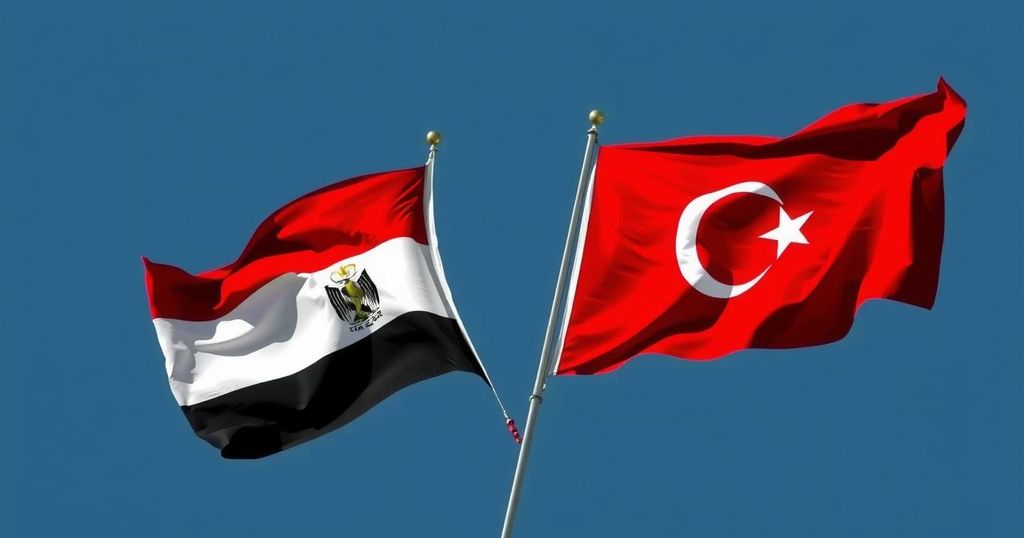Egypt-Turkey Relations: A Beacon of Hope for Libyan Stability
The rapprochement between Egypt and Turkey offers a potential pathway for stabilizing Libya amidst ongoing tensions between rival factions. As both nations seek to jointly navigate the Libyan crisis, their collaboration could lead to significant political and economic gains. The resumption of Libyan oil exports indicates some progress, although challenges persist as various actors vie for control in the volatile environment.
The evolving relationship between Egypt and Turkey, traditionally supporters of competing factions in Libya, may herald new opportunities for stabilizing the conflict-stricken nation. Recently, Libya has resumed oil exports following a hiatus stemming from disagreements regarding the management of the central bank that oversees these exports. Jalel Harchaoui from the Royal United Services Institute emphasized the seriousness of the situation, describing it as a crisis that, despite some resolution, continues to pose challenges that merit attention. The tensions between Libya’s contending administrations led to this temporary cessation of operations, resolved only through extensive negotiations. However, Harchaoui warns that ongoing volatility persists, as various actors, including armed groups in Tripoli, attempt to capitalize on evolving circumstances. In light of these developments, the renewed cooperation between Turkey and Egypt has been regarded as a hopeful factor for ameliorating Libyan tensions. Egyptian President Abdel Fattah al-Sisi remarked on this collaborative spirit during a joint press conference held in Ankara with Turkish President Recep Tayyip Erdogan, stating their commitment to consult each other’s institutions for achieving security and political stability. Historically, Libya was a focal point of rivalry between Turkey and Egypt, with Cairo favoring Khalifa Haftar’s eastern administration and Ankara backing the western Government of National Unity based in Tripoli. However, the necessity for joint efforts in addressing the current Libyan crisis has led to a strategic partnership between the two nations. Murat Aslan of the SETA Foundation articulated that both countries stand to benefit from pushing the Tripoli-based government towards consensus. The economic crises plaguing both Turkey and Egypt add weight to their collaborative efforts in Libya, underscoring the mutual benefits of cooperation. Aya Burweila, a Libyan security analyst, highlighted their ability to coordinate their respective interests effectively, thereby fostering relationships that enhance both political and economic stability. Ankara is relying on Cairo’s influence to further its agreement with the Tripoli government, particularly regarding prospective energy reserves in Libyan waters. Simultaneously, Cairo aims to diminish the power of the Ankara-backed Prime Minister Abdul Hamid Dbeibeh. Despite existing differences, Harchaoui acknowledges a commitment to cooperation between Egypt and Turkey, remarking on their assurance to engage in daily discussions, particularly during critical moments to ensure alignment in their strategies. Nevertheless, he calls for more concrete outcomes from the dialogues already initiated between these nations.
The recent focus on the relationship between Egypt and Turkey arises from the geopolitical situation in Libya, where both nations have historically supported rival factions. Libya’s stability has been tenuous, characterized by internal strife and economic challenges, which have prompted external actors like Egypt and Turkey to reconsider their postures. Their newfound cooperation is posited as a potential stabilizing force amidst the ongoing volatility in the region, especially following a recent lull in oil exports caused by administrative disputes in Libya.
In conclusion, the recent warming of relations between Egypt and Turkey marks a significant step towards potentially stabilizing Libya, as both countries leverage their influence to mediate between the warring factions. While challenges remain, their commitment to daily dialogue and cooperation might yield positive results in addressing the myriad issues plaguing Libya.
Original Source: www.rfi.fr




Post Comment